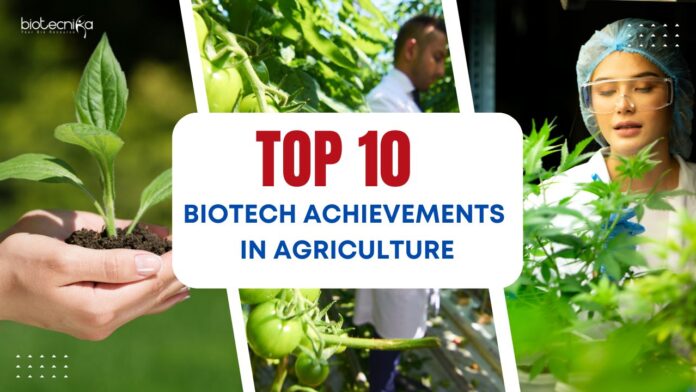Top 10 Biotech Achievements in Agriculture
Imagine a world where barren land is converted into fields of healthy crops, drones hover over fields to ensure perfect irrigation, and farmers use genetics to grow plants that resist drought disease and enhance nutritional quality. This isn’t a far-off dream, but it can be a reality. From the Green Revolution to gene editing, biotechnologist’s efforts to secure food for billions have been nothing short of extraordinary.
As Biocon co-founder Kiran Mazumdar-Shaw said during the inauguration of the 13th edition of Bengaluru India Nano 2024 in Bengaluru, “The application of biotechnology in agriculture is crucial for enhancing productivity, ensuring food security, and addressing the challenges posed by climate change. It is about making farming more sustainable and resilient.”
From gene editing to advanced genetically modified crops, these innovations are helping some of the most important agricultural issues worldwide. Biotechnology in agriculture has changed farming patterns worldwide, increasing productivity, shelf life, and texture and making crops resistant to extreme environmental conditions. Now, let’s have a look at the top 10 Biotech Achievements in agriculture with recent advancements and the leading companies operating the breakthroughs.
1. Imagine crops that are resistant to extreme weather and pests. Genetically Modified Crops (GMOs)
Genetically modified crops are the pillars for increasing the crop yields and reducing chemical use like pesticides, fungicides, and herbicides by incorporating the properties of drought-resistant and pesticide-tolerant crops. Genetically modified crops help farmers to get a good crop yield within a few resources.
In the year 2023, scientists developed a new variant of rice, which is drought resistance, and along with that, they can be grown in low-nitrogen soils, potentially revolutionizing rice farming in nutrient-poor regions. Leading companies like Bayer Crop Science, Corteva Agriscience, and Syngenta focus on seed improvement, enhanced yield, and pest resistance.
Improving Resilience to Drought in Rice and Sorghum through Mutation Breeding
2. Unlock new possibilities in agriculture by creating crops that are more preserving and nutritious – CRISPR Technology
By allowing targeted improvement within the plant’s DNA, CRISPR-Cas9 precise gene editing method has revolutionized crop improvement. This method is an alternative to traditional Genetically modified crops. It enhances disease resistance, nutrient content, and environmental resistance without incorporating foreign DNA.
Recently, in 2024, European researchers successfully implemented CRISPR technology to enhance their resistance to mildew, a critical fungal-affecting disease. This research effectively offers an alternative solution for chemical fungicides and leads toward sustainable agriculture. Leading companies like Bayer Crop Science, Corteva Agriscience, and Syngenta are investing in CRISPR technology, which will lead to enhanced environmental resistance and nutritional values.
3. If your food lacks essential nutrients, biofortified crops can provide a solution.
This technology involves naturally adding nutritional value during breeding periods. Focusing on the areas that are facing malnutrition, such as vitamin and mineral deficiency, one of the big examples is golden rice incorporated to produce beta carotene ( a supplement for vitamin A). The main aim of these is to reduce Vitamin A deficiency, which causes blindness and immune deficiency in children.
In 2022, the Philippines got approval for the cultivation of golden rice. Biofortification has given the path to success for biofortified crops such as zinc-enriched wheat and iron-enriched beans.
Institutes and companies like the International Rice Research Institute and Harvest Plus focus on the Biofortification method to enrich the nutrient value of crops.
In 2024, research highlighted by the Institute of Food Technologists (IFT) focuses on biofortified crops as a solution to micronutrient deficiencies, or “hidden hunger.” such as iron-rich beans, zinc-rich rice, and vitamin A-rich sweet potatoes, showing their potential to improve global nutrition.
Read More: The Promise of Underutilized and Biofortified Crops
4. Are BT Crops Solutions for Farmers?
BT crops are genetically modified crops that produce a natural insecticide called Bacillus thuringensis or Bt toxin. These bacteria produce a specific protein called “cry protein” that is toxic to insects. Countries like the United States, Brazil, and India use BT crops to reduce the yield loss of crops like BT Cotton and BT corn. This method helps to reduce the use of chemicals in agriculture and maintain the high productivity of the crops.
In 2024, a study focused on enhancing pest resistance in Bt cotton using CRISPR-based gene editing and RNA interference (RNAi). This research aims to prevent pests like cotton bollworms from developing resistance to Bt toxins, thus prolonging the effectiveness of Bt crops. By targeting specific genes in pests, these biotechnological innovations offer a sustainable solution for pest management in cotton farming.
Read More: Emerging technological developments to address pest resistance in Bt cotton
Top 10 Biotech Achievements in Agriculture
5. Is RNAi Technology’s Surprising New Method Against Crop-Destroying Insects
RNAi technology is a safe, eco-friendly solution for crop production. This technique focuses on the targeted pests without affecting the other pollinators and making it precise. It enables the incorporation of a particular gene in a pathogen or pest to get novel methods to control agriculture problems.
RNA interference (RNAi) technology has agricultural applications, including enhancing crop resistance, pest control, and improving plant traits like drought tolerance. Though the 2024 Nobel Prize in Physiology recognized research on microRNA for gene regulation, its implications extend to agriculture, offering the potential for sustainable farming by targeting specific genes in crops and pests.
The Nobel Prize in Physiology or Medicine 2024

6. Drought-tolerant crop. The Miracle Crops growing in extreme conditions
The drastic change in the climate leads to unpredictable weather patterns and drought, which adversely affect the production of crops. Crops need an appropriate amount of water and nutrition for proper growth and development. Lack of water and nutrient content in the soil affects the biological properties of the plants. To reduce these, researchers and some companies are focusing on Drought-Tolerant crop breeding, which can grow in minimal water with good yield.
In 2023, Kenya, Ethiopia, and Zimbabwe introduced drought-tolerant maize crops. This crop is beneficial to areas that have less rainfall patterns. Companies like Bayer Crop Science and Corteva Agriscience are developing drought-tolerant crops for regions like Africa.
7. Synthetic Biology the Future of Farming
Integrating the conventional breeding method by introducing modern synthetic biology techniques. These fields had a great impact on producing crops that are able to make their synthesized fertilizers, are resistant to extreme conditions, and produce important byproducts like pharmaceuticals. This advanced method enables the insertion of multiple genes in a single host, either derived from another organism or synthetically generated.
In 2024, synthetic biology is driving significant advancements in agriculture, focusing on sustainable practices and enhanced food security. Researchers are using gene editing tools like CRISPR to create crops resistant to pests, diseases, and extreme weather. Leading companies like Ginkgo Bioworks and Synthetic Genomics focus on the development of synthetic biological products for agriculture.
8. Biotech: The Hidden Hero of Sustainable Farming
Biotechnology plays an important role in improving soil fertility and sustainable farming methods by introducing naturally derived biopesticides and biofertilizers. These products are less harmful to the environment and help to increase the yield of the crop.
In 2022, a new biofertilizer was introduced in the market that enhanced the growth of the crop by natural nitrogen fixation. Firstly, this biofertilizer is used in legume plants and reduces the use of synthetic fertilizers, hence decreasing greenhouse gas emissions in agriculture. Companies like AgBiome and Marrone Bio Innovations focus on discovering and developing sustainable farming practices for soil improvement and crop yield.
A study conducted in 2024 by the University of Liège demonstrates how AI is revolutionizing sustainable agriculture by enhancing resource management, improving irrigation systems, and maximizing crop yields with reduced environmental footprints.
9. We can improve soil naturally with soil Microbiome engineering.
Soil Microbiome, the group of microorganisms like bacteria and fungi in the soil, plays an important role in the development and growth of the plant. Plant roots secret different types of molecules, which may sometimes be beneficial or sometimes harmful for the soil microbiome. Observing all these scientists aim to provide better nutrients, root uptake, and yield by decreasing the use of chemical fertilizers.
In 2023, Scientists introduced the root microbiome of maize by reducing the use of synthetic fertilizers. Companies like Pivot Bio, Indigo Agriculture, and Bioceres focus on improving soil microbiomes and reducing the use of synthetic fertilizers.
Read More: Advanced artificial intelligence: A revolution for sustainable agriculture
10. From Lab to Field Clonning Tissue Culture is Transforming Agriculture
Tissue culture plays an important role in the preservation of endangered species of plant. Plant cloning tissue culture accomplishes in vitro plant growth and rapid multiplication of high-quality, disease-free plants. Tissue culture and cloning techniques are widely used in horticulture and commercialized agriculture for equal distribution of nutrition with high yields. This technique has been successfully reported in 100 species of plants.
In 2023, this method was used to conserve a rare wheat variety from a limited number of seeds. These varieties are grown and successfully commercialized to help farmers face climate change. Companies like Syngenta and Corteva Agriscience utilize tissue culture techniques to get high-yield and disease-resistant plants.
Read More: Climate change and the future of wheat production
The advancements in agricultural biotechnology showcase the incredible potential of human innovation to solve pressing global challenges. From nutrient-rich crops to sustainable farming practices, these breakthroughs pave the way for a future where food security, environmental sustainability, and agricultural resilience are within our reach. By embracing these technologies and supporting research, we can ensure a thriving and sustainable world for future generations.
The future of farming is bright, and the seeds of hope are already being sown.
Top 10 Biotech Achievements in Agriculture






































